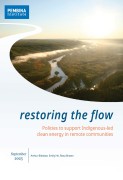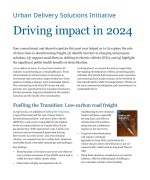C4D — the Canadian Coalition on Climate Change and Development
The Coalition is a group of over 15 development and environmental organizations that joined together in 2006 to share knowledge and take concerted action to address climate change. We aim to build the capacity of the international development community to address the challenges which climate change poses to sustainable development, and to bring the voice of the international development community to the debate on Canada’s response to climate change.
Case Studies:
International Institute for Sustainable Development and Centre for Science and Technology Innovations
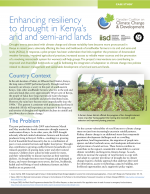 In Kenya, drought events have become more pronounced in recent years, adversely affecting the lives and livelihoods of smallholder farmers. IISD and CSTI have undertaken a pilot project that links together downscaled weather forecasts, improved agriculture practices, increased access to reliable water, and a revolving microcredit system for women's self-help groups. These initiatives contribute to improved and diversified livelihoods, and facilitate the integration of climate change in policies related to disaster management and sustainable development.
In Kenya, drought events have become more pronounced in recent years, adversely affecting the lives and livelihoods of smallholder farmers. IISD and CSTI have undertaken a pilot project that links together downscaled weather forecasts, improved agriculture practices, increased access to reliable water, and a revolving microcredit system for women's self-help groups. These initiatives contribute to improved and diversified livelihoods, and facilitate the integration of climate change in policies related to disaster management and sustainable development.
Canadian Foodgrains Bank
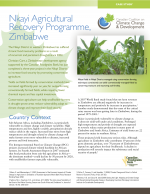 In the Nkayi District of western Zimbabwe, chronic food insecurity is the result of recurring and persistent droughts stretching back nearly a decade. A three-year project of the Foodgrains Bank and Christian Care — a local partner — has demonstrated that promoting conservation agriculture can increase yields, decrease chemical inputs and lower capital investment required from farmers. The result? Increased food security and greater resilience to climate change in a drought-prone area.
In the Nkayi District of western Zimbabwe, chronic food insecurity is the result of recurring and persistent droughts stretching back nearly a decade. A three-year project of the Foodgrains Bank and Christian Care — a local partner — has demonstrated that promoting conservation agriculture can increase yields, decrease chemical inputs and lower capital investment required from farmers. The result? Increased food security and greater resilience to climate change in a drought-prone area.
Oxfam Canada
 In the lowland communities of Bolivia, there is a widespread perception of unpredictability of rains, warmer temperatures, and increases in extreme weather. Terrible flooding in Beni in 2007 and 2008 motivated local communities to enlist with Oxfam in a project known as the camellones ('raised fields'). This farming practice draws on both ancient techniques and modern science to offer a sustainable solution to flooding, drought and overall food insecurity.
In the lowland communities of Bolivia, there is a widespread perception of unpredictability of rains, warmer temperatures, and increases in extreme weather. Terrible flooding in Beni in 2007 and 2008 motivated local communities to enlist with Oxfam in a project known as the camellones ('raised fields'). This farming practice draws on both ancient techniques and modern science to offer a sustainable solution to flooding, drought and overall food insecurity.
World Vision Canada
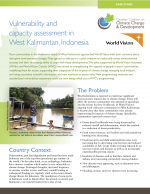 On the Indonesian Island of West Kalimantan, communities concerned about the disruptive forces of environmental and climate stresses participated in a pilot project to assess the environmental stresses and the local capacity to cope with them. Incorporating local wisdom, scientific knowledge of climate change, and risk assessment strategies, World Vision has developed new programming methods and standardized vulnerability assessment tools to better address the complex relationship between climate change, environmental degradation, food insecurity and child malnutrition.
On the Indonesian Island of West Kalimantan, communities concerned about the disruptive forces of environmental and climate stresses participated in a pilot project to assess the environmental stresses and the local capacity to cope with them. Incorporating local wisdom, scientific knowledge of climate change, and risk assessment strategies, World Vision has developed new programming methods and standardized vulnerability assessment tools to better address the complex relationship between climate change, environmental degradation, food insecurity and child malnutrition.
Care Canada
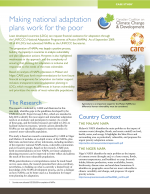 CARE's 'case study' stands apart from the others; rather than focusing on the lessons of one particular project, CARE has examined the process of developing National Adaptation Plans of Action (NAPA) in Malawi and Niger. Worryingly, gaps in the NAPA process as identified by CARE demonstrate that the priority actions included in the NAPAs are inadequate in addressing the needs of the most vulnerable groups. CARE provides recommendations to improve the process.
CARE's 'case study' stands apart from the others; rather than focusing on the lessons of one particular project, CARE has examined the process of developing National Adaptation Plans of Action (NAPA) in Malawi and Niger. Worryingly, gaps in the NAPA process as identified by CARE demonstrate that the priority actions included in the NAPAs are inadequate in addressing the needs of the most vulnerable groups. CARE provides recommendations to improve the process.
Note: Click on the thumbnail image of each fact sheet to download.




